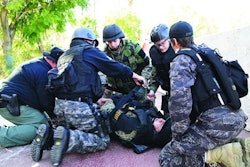Countless numbers of officers have permanently walked out the door of their police agencies in the two years since the damaging and dangerous "Summer of Love" riots across the United States that reportedly caused an estimated $2 Billion in property damage and cost as many as 18 lives in at least 140 cities.
The exodus—some officers leaving for other employment opportunities in law enforcement or abandoned the profession altogether—has been well documented. It was reported in June that more than 1,500 NYPD officers have either resigned or retired so far in 2022—that's a 38% spike from the same period in 2021.
On the other side of the continent in San Francisco, Lieutenant Tracy McCray—who serves as her agency's POA president—said in a presentation before the Police Commission that in a poll of association members, more than 54% said they planned to leave the department within the next year or move to another law enforcement agency.
The same situation has been seen in cities across America. Consequently, law enforcement leaders sought to find new to ways retain the officers on their departments. One compelling solution is to provide the best training possible to every officer on the department. Not only does this best equip the police on the streets to meet new and changing challenges, but it incentives people to stay and better themselves and their careers.
How can agencies simultaneously increase job satisfaction and improve retention by creating and keeping excellence in the ranks?
Creating (and Keeping) Excellence
Police leaders seeking to build a world-class organization will often first point to hiring standards.
"We look for dedicated employees who are kind compassionate, problem solvers who care about what they're doing and you make decisions to make things better. I think that's really a game changer to the internal culture of the department," says James Small, chief of public safety for the Village of Palmyra, WI.
Small adds, "You care about what you're doing and you make decisions to make things better."
John Bostain, advisory board member for the International Law Enforcement Educators and Trainers Association (ILEETA) and president of Command Presence Training, says, "Recruiting and retention in law enforcement has to be like Division I schools going after the best athletes in the country."
Without doubt, recruiting is an excellent foundation, but as is evidenced in every team sport at every major college in the country, great recruiting is worthless without great coaching, great facilities, and a great atmosphere.
Tim Barfield, chief of police at the Wellington (OH) Police Department, says, "You want to create an organization where everyone thinks, 'This is the place for me. This is my spot.' You want your people to know that not only did the chief go to bat for [them] to get training budget, but [they] know they're protected. They know that if something comes up that they'll need to be trained in, they're going to be trained in it."
Barfield adds that this really boils down to creating a culture of training that goes beyond "check the box" but builds on the very importance of training to advance one's career and bring them happiness."
"I don't think that's as hard as it seems, but you have to be intentional about it," Barfield says. "I don't think most chiefs are intentional about training."
Increasing Job Satisfaction
To Barfield's point, the best police leaders are careful to ensure that everyone in the organization knows that the agency places value not only on what each employee brings to the table today, but what they potentially can become as their career progresses.
This goes much further than the commonly held concept of "succession planning," which typically translates to chain-of-command—"Who's the next chief?" or "Who's the next captain?"
Barfield says, "You need to let your people experiment with training they have an interest in. I often pick classes for people because I think of their talents and needs but I also allow them to select training areas they are interested in."
Bostain also recommends taking into account what the next generation of officers wants—not what the current generation wants for them or from them.
"When you ask recruits what they want in their career, you'll find they know they're going to do patrol, but you'll find that they want to go on to specialty areas eventually," he says.
"They want the training to get there. Why wouldn't we expose them to things they're interested in? Why not give 'em some time in investigations, even if it's only for a week or so? Why not allow 'em to spend more than one shift riding with canine? Why not allow them actual on duty time to explore some of these areas? Then they have an idea of where they're going and quite honestly have a pathway set up for them. Quite honestly, they're going to serve the communities better if they can pursue those desires."
Small calls this organizational nourishment.
"How are we building ourselves?" Small asks. "What's our ongoing development plan? How are we growing in our skill set? How are we fulfilling what our interests are? What are we doing for our wellness?"
Improving Employee Retention
The obvious outcome of a deep and robust commitment to training—for every officer at every level and every stage in their career—is increased individual job satisfaction. The secondary outcome is an answer to the question of employee retention—a problem vexing the abovementioned agencies presently hemorrhaging personnel at an alarming rate.
Small says simply, "If you create a better morale situation, you're going to have people who are happy not just with the job that they're doing, but their vision for their career path. In the training they're getting through their agency, they feel like their agency values them and is investing in them."
Any agency failing to do everything it possibly can to retain its people will inevitably lose their best and brightest to other departments.
Bostain says, "Create new opportunities. We're not talking about mandatory training—we're talking about providing officers training in areas that they're interested in. That is a retention issue. If you won't do it, other agencies with better culture will."
Barfield concludes, "Training is partly an engagement tool—it keeps people fresh, it keeps them learning new things, and it makes them feel good."
By investing in excellent training programs, police agencies can create pathways for career advancement that incentivize longer careers, cultivate future leaders for challenges that lay years or decades down the road, and ensure the best possible level of public safety in the community.
By any reasonable measure, that's a winning strategy for everyone concerned.
















